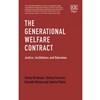generationstim
Studies on climate ethics and future generations vol. 4
Working papers 2021:11-23 Joe Roussos & Paul Bowman (eds.) Democratic Representation of Future Generations and Population EthicsGustaf Arrhenius Global Justice and Future Generations: The Case of Sov
Stephen Gardiner: Generationally Parochial Geoengineering - A Threat to the Young and Other Future Generations
Place:At the Institute for Futures Studies, Holländargatan 13, Stockholm, or online. REGISTERAbstract'Geoengineering' has come to refer to massive, deliberate technological interventions into fundamentis Professor of Philosophy and Ben Rabinowitz Endowed Professor of the Human Dimensions of the Environment at the University of Washington, Seattle, where he is also Director of the Program on Ethics. His research focuses on global environmental problems, future generations and virtue ethics.Join the seminar online or at the Institute for Futures Studies. If you will join on site, please check the box in the
Studies on climate ethics and future generations vol. 3
Working paper series 2021:1-10 Joe Roussos & Paul Bowman (eds) This volume comprises the third collection of working papers by researchers within the program Climate ethics and future generations.Th

Future generations
Climate change is the biggest challenge of our time, and in this theme there is a focus on future generations and their living conditions. We aim to examine among other things climate ethics, sustainable development, green growth, obstacles to climate action and social dilemmas.

A welfare state for all generations
In a society there are always several generations co-existing and they all need different things from the welfare state. This result is a conflict between generations on who should be favored by publi by , Tommy Ferrarini, Kenneth Nelson and Joakim Palme.
Discrimination and Future Generations
In: Mosquera, J. & O. Torpman (ed.),Studies on Climate Ethics and Future Generations vol. 6. Working Paper Series 2024:10–17 Abstract In this paper, I analyse whether the present generation’s choices. This has been tentatively suggested in both legal theory and philosophy; I review such suggestions briefly in section 1. However, a more rigorous analysis – outlining the concept, relevant grounds, and wrong-making features of discrimination, and applying these to future generations – is still lacking. To address this lacuna, I propose a theory of discrimination and analyse why it might seem to apply – yet ultimately fails to apply – to the differential treatment of future generations. More specifically, I propose a definition of discrimination (section 2.1) and an account of the moral wrongness of discrimination (section 2.2). I moreover explore the connection between discrimination and theories of social (in)justice (section 2.3). I then apply this theory to the problem of differential treatment of future generations. While discrimination may occur between collectives, such as generations (section 3.1), my analysis shows that the specific temporal status of future generations is not comparable to other grounds of discrimination, such as gender or race (section 3.2). Moreover, due the non-identity problem and the problem of lack of a “community of social meaning” between generations, future generations cannot be claimed to be subjected to worse treatment by the present generation (section 3.3). Hence, their differential treatment due to the present generation’s choices does not amount to discrimination. Section 4 concludes and outlines some upshots of my analysis.

Climate Change and Future Generations
What we do - or fail to do - about climate change now will impact the lives of billions and billions of people in the future. What is the right thing to do? This animated short film highlights the cho
Constructivist Contractualism and Future Generations
In The Oxford Handbook of Intergenerational Ethics, Stephen M. Gardiner (ed.), s. C36.S1 - C36.N20. Abstract In constructivist contractualist theories, such as Rawls’, principles of justice should mirror
Climate ethics and future generations
Workshop within the research project "Climate ethics and future generations", 27–29 September. Audience members admitted by invitation only. 1st Day – 27th September 8:45 – 9:15 Coffee/Breakfast 9.1
An Ombudsman for Future Generations, Legitimate and Effective?
in: Institutions For Future Generations, Iñigo González-Ricoy and Axel Gosseries (red.), Oxford: Oxford University Press. 117-134. This chapter examines the possibility to establish ombudsmen as instr








